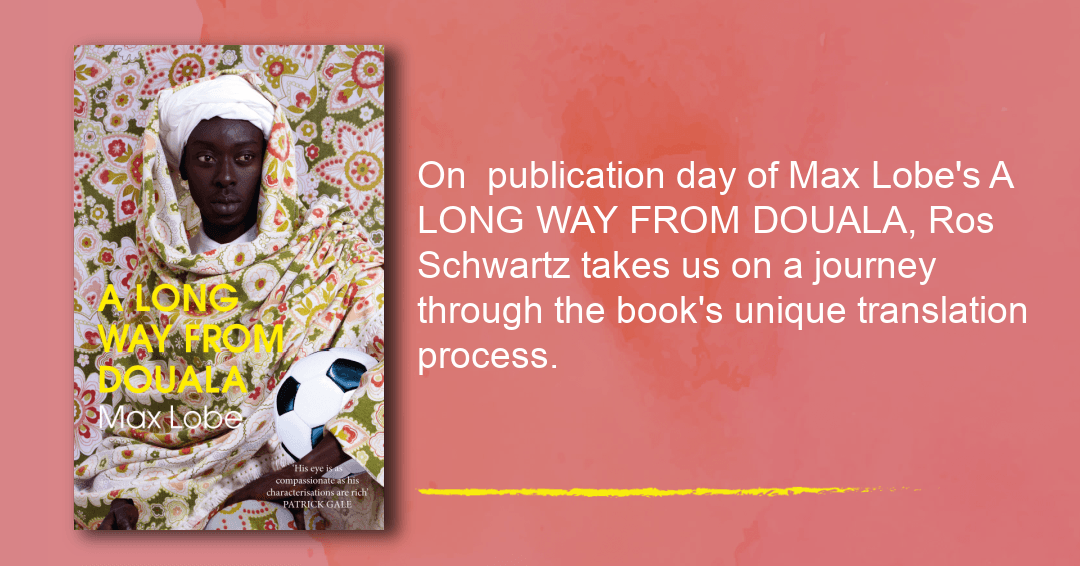What makes a European woman in her sixties, old enough to be the writer’s grandmother, the right translator for a young, gay, Cameroonian-Swiss author? I had to do some soul-searching before agreeing to take on this project.
When HopeRoad approached me because I’d already translated a short story by Max Lobe, “The Avenging Whip”, published in Words Without Borders. So that was one reason for considering the task. But the decisive motivation was empathy. I loved the book at once. I believe empathy is one of the most crucial ingredients in the alchemy that makes a translation either fizz or fall flat. And just as actors are able to get under the skin of the character they are playing, translators need to be chameleons too, so as not to be typecast. What’s more, the theme of a soccer-crazy young boy’s dream of making the journey to Europe to become a famous football star echoes that of Fatou Diome’s Belly of the Atlantic, which I translated with Lulu Norman.
Familiarity with the setting of a novel is another crucial factor for me. The storyline of A Long Way from Douala revolves around a road trip across Cameroon in the narrator Jean’s bid to find his runaway older brother. I did not know Cameroon, but I had travelled from Mali to Côte d’Ivoire on a similarly eventful bus trip. Serendipity had a hand in my decision. Just as I was about to start work, I was invited to lead a workshop in Yaoundé as part of a project spearheaded by Madhu Krishnan at the University of Bristol, in association with Bakwa Books, Yaoundé, to train literary translators in Cameroon. The workshop was held in October 2019, at the point when I was revising my translation. It was a godsend. I subjected some of the sections I was unsure about to scrutiny by the students, and they set me right on countless local details. It was a humbling experience which underlined for me just how vital local knowledge is. And the icing on the cake (literally!) was that the cook who catered the week-long workshop went out of his way to make all the dishes featured in the book. It made a huge difference being able to see, taste, smell, and touch the foods.
The biggest translation challenge was Max’s use of Camfranglais, an urban slang that’s a mixture of French, English, Pidgin and borrowings from indigenous languages, of which there are close to 250 in Cameroon. It also includes some English words with a French pronunciation, but not used by English-speakers. For example, instead of saying “tu ferais mieux de …” (you’d better …) in standard French, they say “better tu fais ça”. Other words are inspired by local languages, such as the concept of boys making their journey to Europe, known as “boza”. I chose not to translate these words, which is an ethical decision. I am careful not to ‘colonise’ the translation by making it read as if written by an English person sitting at home in London. The cultural specificity has to be preserved, and that is what is so enriching about translated literature. Max is based in Geneva and, while set in Cameroon, the book is written with the European reader in mind. There are words that are equally unfamiliar to the French and to the English reader, but he uses Camfranglais expressions in a way that is understandable for the non-Cameroonian reader. I have preserved the words that are neither standard French nor English, sometimes weaving in an explanation, such as the sôlô-quarters, meaning the slum areas. Or the word pimentière (chilli-pepper seller), which is a synonym for prostitute. This word comes up for the first time in a whole string of insults which are all variations on the word “whore”. At this point it’s very clear what pimentière means and so it is possible to use the expression throughout the book without having to explain it. Readers aren’t stupid. HopeRoad asked me to add a glossary of Camfranglais words at the back of the book, so it is there if the reader wishes to refer to it, but the narrative flow isn’t interrupted.
It is important to me to meet the author of the book I’m translating to help me capture their voice. I was fortunate to be able to stay at the Translators House in Looren, Switzerland, in January 2020, before the pandemic hit, where I spent a very productive two days with Max, fine-tuning the translation. We also had a lot of fun – despite the generational gap, we share the same irreverent sense of humour. There’s a lot of music in the book, and Max would play a makossa and sweep me up in a dance around the august library. He read excerpts of the French out loud and then I tweaked the English, taking account of the music and tempo of the original. It’s not just the meaning of the words that matters, but also the sounds and rhythms. The translator constantly has to weigh up priorities. Some elements are non-negotiable, but there are others that offer a little wiggle room. It’s like a linguistic Rubik’s Cube.
Ros Schwartz
London
February 2021
